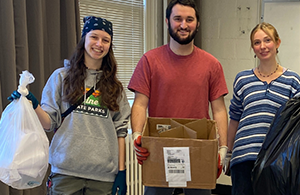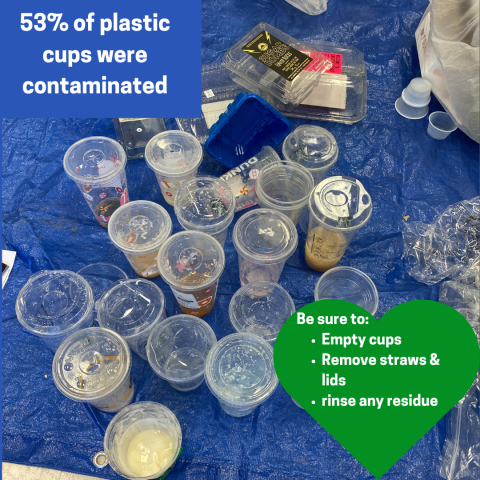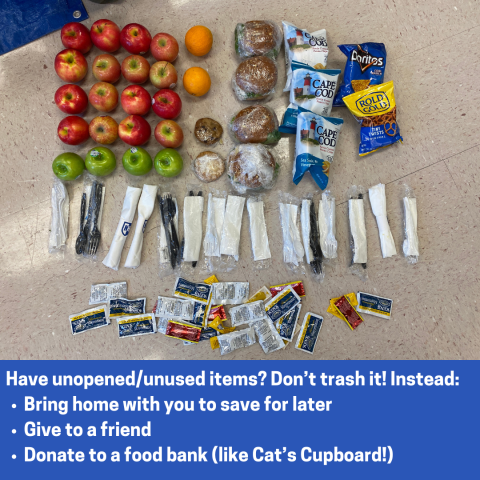Waste Audit Assesses Recycling Habits to Inform Education to Peers on Campus

One of the main goals of the Sustainability Institute’s Zero-Waste Interns is to figure out how to produce less waste on campus and an important aspects of this is recycling. As you walk around campus, on top of recycling and waste bins, there are labels and signage that indicate what goes in which bin. We wanted to investigate how effective this signage is and whether it is enough to help students and faculty dispose of their waste properly. On Friday, December 6, 2024, we collected bags from the recycling bins in Paul College to perform a waste audit to see how many of the items in the recycling bins were actually able to be recycled.
What is a waste audit?
A waste audit is a process of sorting and organizing waste to count the amount and types. It determines how current waste management and practices can be improved. Along with this, we were also looking to identify and measure items that could be recycled, but that were contaminated. A contaminated item means that it is dirty or damaged in a way that causes the product to no longer be recyclable. Recyclable products must be clean, with very little residue. For example, did you know that if a plastic drink bottle still has liquid in it when tossed into the recycling bin, it can no longer be recycled, and may make the entire bin no longer recyclable?
In our case, we use waste audits to see how we can better help recycling and waste practices at UNH. We also use them to see how our academic buildings differ in their waste management practices as buildings around UNH all have different signage on waste bins. These waste audits can help us target certain buildings that need the most help with properly disposing of waste.
What did we find?
Overall, we collected 17 bags from the recycling bins in Paul College. After we sorted, we ended up with three full bags of trash - which didn’t include the number of contaminated recyclable products. We found fruit, untouched sandwiches, unopened bags of chips, and condiment packets, and that only scratched the surface. Out of all the plastic cups that were found, 53% were contaminated with leftover liquid and residue, and 97% of plastic bottles were contaminated. 77% of all coffee cups were contaminated, and 23% of cardboard was contaminated.

In total, over 53% of all the waste collected from the recycling bins was either trash or contaminated, meaning it will end up in landfills or pollute our land and oceans. The contaminated products can also rub off their residue onto other products in the recycling bins, making even more products unable to be recycled.
Why is proper recycling important?
Out of all the items that are thrown away into recycling bins, only a small percentage is actually recycled because of contaminated and misplaced waste items. Along with this, some products that are being sold and marketed as recyclable require steps before they can be tossed. For example, if a product is made with cardboard and plastic, they need to be separated to be recycled. The most prominent example of this is plastic drink bottles. These bottles are made of plastic and are then surrounded by paper. For these to be properly recycled, the paper needs to be removed. Although some companies are making it more difficult to recycle their products, it’s necessary to research the proper steps so less waste is generated.
How can you help?

It’s important for everyone to educate themselves on proper recycling and waste disposal practices. If you are unsure if something is recyclable or not, it never hurts to research it. Most times, products also say on their packaging if they can be recycled or not. It is also important to ensure recyclable products are clean and uncontaminated by food or drink waste before they are disposed of. Encouraging others to maintain proper recycling practices is also important! Don’t be afraid to kindly educate others about correct waste disposal habits because we all have an impact on our campus, community, and the Earth.
